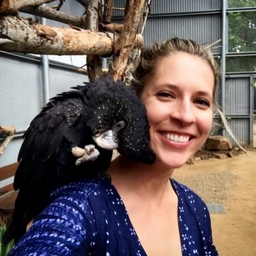
Justine E Hausheer
Science Communications Specialist - Asia Pacific at The Nature Conservancy
Follow me @justinehausheer.bsky.social. 🦋 science writer/editor @nature_brains. Book on Australian wildlife conservation out in 2026 from NewSouth.
Articles
-
1 week ago |
blog.nature.org | Justine E Hausheer
Dawn in Wongabel forest. It’s June, and there’s a hint of winter chill as I trudge up and down the forestry tracks. I’ve traveled here, to the Atherton Tablelands, in search of some of Australia’s most bizzare and fabulous mammals: rotund, green-furred possums, others that are striped like skunks, and a tiny macropod that looks like a rat. But the species I most want to see — a tree-kangaroo — is hiding somewhere in this forest.
-
2 weeks ago |
blog.nature.org | Justine E Hausheer
When thinking of the influences that shaped my career and life paths, it’s a long list: Ranger Rick and National Geographic, Field & Stream and Mutual of Omaha’s Wild Kingdom. The Golden Guide series of childhood field guides would have to be near the top of the list. During the summer vacation, these books were never far from hand, particularly titles like Seashores and Pond Life. They helped me identify the little creatures I’d find on the beach or at farm ponds.
-
2 weeks ago |
blog.nature.org | Justine E Hausheer
It’s a postcard-worthy scene: a 20-foot waterfall cascading into a deep pool, running with some of the clearest, bluest freshwater you’ve ever seen. We aren’t hear for the views, though. Not today. My friend George stops to change out of the hiking boots he wore on the hike down into the canyon, replacing them with wading shoes. He motions to me to begin fishing. I step towards the pool, lined most of the way with streamside vegetation. I step near the churning blue water.
-
3 weeks ago |
blog.nature.org | Justine E Hausheer
The Nature Conservancy’s Cave and Karst Program Manager Cory Holliday likes to think of caves as a “bonus habitat.” He says, “if you’re in a place with caves, that’s just an extra ecosystem.”Holliday’s home of Tennessee has an abundance of caves. These 12,000 habitats help make the it the most species-rich inland state in the country. Similar to sinkholes and springs, karst caves are formed over long periods of time when water moving underground dissolves soluble bedrock.
-
1 month ago |
blog.nature.org | Justine E Hausheer
My young son and I dug with our plastic shovels, fortifying the sand castle against the oncoming tide. In one scoop, my son gave an excited yell of surprise. He swiveled to show me the creature perched on his shovel. To me, this animal has always resembled a fat shrimp that has lost most of its tail. Or perhaps, a supersized sowbug. We admired it briefly, then placed it back down in the sand.
Try JournoFinder For Free
Search and contact over 1M+ journalist profiles, browse 100M+ articles, and unlock powerful PR tools.
Start Your 7-Day Free Trial →X (formerly Twitter)
- Followers
- 2K
- Tweets
- 6K
- DMs Open
- Yes